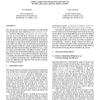Free Online Productivity Tools
i2Speak
i2Symbol
i2OCR
iTex2Img
iWeb2Print
iWeb2Shot
i2Type
iPdf2Split
iPdf2Merge
i2Bopomofo
i2Arabic
i2Style
i2Image
i2PDF
iLatex2Rtf
Sci2ools
WSC
2004
2004
Approaches for Modeling Individuals Within Organizational Simulations
The human behavior modeling community has traditionally been divided into those addressing individual behavior models, and those addressing organizational and team models. And yet it is clear that these extremes do not reflect the complex reality of the mutually-constraining interactions between an individual and his/her organizational environment. In this paper we argue that realistic models of organizations may require not only models of individual decision-makers, but also explicit models of a variety of individual differences influencing their decision-making and behavior (e.g., cognitive styles, personality traits, and affective states). Following a brief review of individual differences and cognitive architectures research, we describe two alternative approaches to modeling the individual within an organizational simulation: a cognitive architecture and a profile-based social network. We illustrate each approach with concrete examples from existing prototypes.
Individual | Individual Behavior Models | Individual Differences | Modeling And Simulation | WSC 2004 |
| Added | 31 Oct 2010 |
| Updated | 31 Oct 2010 |
| Type | Conference |
| Year | 2004 |
| Where | WSC |
| Authors | Eva Hudlicka, Greg L. Zacharias |
Comments (0)

